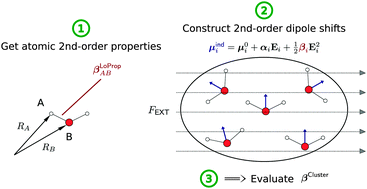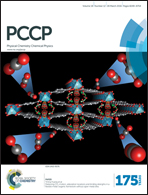Hyperpolarizabilities of extended molecular mechanical systems†
Abstract
We propose and evaluate algorithms for the calculation of molecular polarizabilities and hyperpolarizabilities of extended chemical systems. These algorithms are generalizations of the Silberstein–Applequist procedure involving interacting induced classical dipoles through the localized polarizabilities and hyperpolarizabilities. The models are evaluated in terms of interacting molecular units as well as interacting atomic units that result from the atomic decomposition scheme known as the LoProp transformation. We introduce a generalized LoProp scheme which applies to hyperpolarizabilities as well as to polarizabilities. The accuracy of the second-order Applequist method is tested for the first hyperpolarizability for the TIP3P water model using both Hartree–Fock and density functional theory evaluated with different basis sets. Possible applications and ramifications of the scheme are discussed.


 Please wait while we load your content...
Please wait while we load your content...